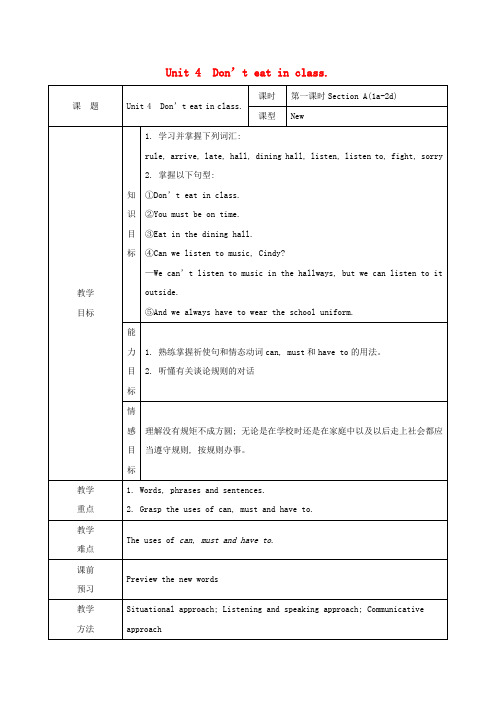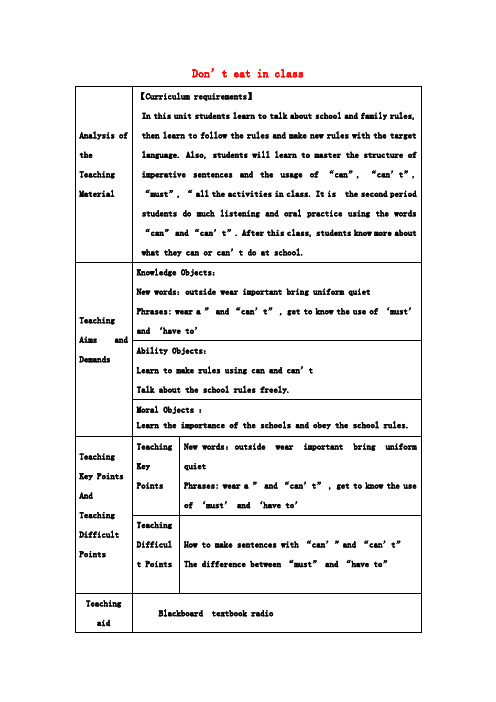七年级英语下册Unit4Don’teatinclassPeriod5教案(新版)人教新目标版
- 格式:doc
- 大小:86.00 KB
- 文档页数:2



Unit4 Don’t eat in class.Ⅰ. Analysis of the Teaching Material1.Status and FunctionIn this unit students learn to talk about school and family rules.Such a topic is so familiar to students that they must be active in all the activities in class.It is helpful to raise learning interest and useful to improve students’ listening,speaking,reading and writing skills.(1)The first period introduces some negative imperatives first.Then students are provided with much listening and oral practice using the target language “What are the rules?”(2)In the second period students do much listening and oral practice using the words “can” and “can’t”.After this class,students know mo re about what they can or can’t do at school.(3)The third period provides students wit h much oral practice using the phrase “have to”.And the game in the last part is useful to raise learning interest.It is useful to improve spoken English.(4)In the fourth period students learn to talk about what they do or don’t have to do at home.(5)In the fifth period students learn to write a letter to talk about their family rules.And they also learn to talk about some common signs.All the activities are desi gned to improve students’ rea ding and writing skills.(6)The self check in the last period is designed to give students more reinforced practice,especially writing practice.In this way,students better understand how to apply what they have learned in their daily life.2.Teaching Aims and Demands(1)Knowledge ObjectsIn this unit students learn to talk about rules.Make students learn and grasp imperatives and the usage of the words “can” and “have to”.(2)Ability ObjectsTrain students’ listening,speaking,reading and writing skills.Train students’ integrating skills.(3)Moral ObjectAs students,we must obey school rules.3.Teaching Key PointsLearn the key vocabulary and the target language. Learn the imperatives and the words “can” and “have to”.4.Teaching DifficultiesTrain students’ listening,speaking,reading and writing skills. Learn to writ e a letter.5.Studying WaysTeach students how to talk about rules in daily life.Ⅱ.Teaching Guidancenguage Function: Talk about rules.2.Target Languages:Don’t eat in class! Can we wear hats? No,we can’t.We don’t have to wear a school uniform.3.StructuresImperatives. Can for permission. Modal have to.4.Key Vocabularyin class, classroom, hallway, gym, arrive,hate,go out, practice, inside, outside, uniform, sports shoes,fight,can,can’t,have to5.Learning Strategies: Scanning. Deducing.Ⅲ. Periods: Six periods.Period 1 (Section A: 1a-2d)Step 1 Revision Review some key words and language points learned in Unit 11 briefly.Point to the pictures one by one and teach students to say,Don’t arrive late for class.Don’t run in the hallways.Don’t eat in the classrooms.Don’t listen to music in the classrooms.Don’t fight.Write the rules on the blackboard.Read and have students repeat several times.Students open their books. Point out the list of school rules.Invite a different student to read each rule to the class.Step 2 Call students’ attention to the picture.Say, Each of these students is breaking one of these rules.Write the number of the rule each student is breaking in the box next to him or her.Point out the sa mple answer.Students do the activity individually.Check the answers.Answers 1.boy looking at his watch2.boy running in the hallway3.girl eating an apple4.boy with headphones5.boys sitting at desks,fightingStep 3 1bAsk students to read the five rules in activity 1a once more.Point to the three names.Say,You are to listen to a conversation.Three students are breaking the rules.Listen and write the number of the rules next to the name of the student who is breaking the rules.Play the recording for the first time.Students only listen.Play the recording again.This students listen and fill in the number of the rule after each name.Correct the answers.Answers Peter:2 Nicki:3 Joseph:4Step 4 1cInvite a pair of students to read the sample conversation to the class.Write it on the blackboard.Put students into pairs.Say,Student A is an exchange student.He or she doesn’t know the rules in the school.Student B tells him or her about the rules in 1a.Get students to work in pairs.As they are working,move around the room offering help as needed.Get some pairs of students to present their conversation to the class.(This activity provides oral practice using the target language.)Step 5 SummaryIn this class we’ve mainly learned to talk about school rules. As students, we must obey school rules.Step Ⅵ HomeworkWrite down the rules in activity 1a without looking at books.Step 6 Blackboard DesignReflection after class:___________________________________________________________________________________________ ___________________________________________________________________________________________ _________________________________________________________Period 2 (section A: 3a,3b,3c)Step1 RevisionT: Hello. What day is it today? What’s the weather like today?T: It is a good day today. Can we play pingpong outside?Can we run outside/in the hallways? Can we fight in the classrooms?Can we e at an apple in a dining hall? Do you like movies?Do you want to go to a mo vie?Today we are going to watch a short play about rules. It is made by our classmates.When you are watching the play, you should to remember what rules they are breaking. Use the sentence like : Don’t …S1: Don’t arrive late for school. S2: Don’t talk in class. S3: Don’t listen to music in class.Step 2PresentationT: Excuse me. What time does the school begin in the morning?S: It begins at …T: Yeh, so I have to arrive at school at ….What about you?What time do you have to arrive at school in the morning?S: I have to arrive at school at…T: As students, what do you have to do in the school?S: We can’t listen to … eat in class. fight. …T: What can you do at home?S: I can play computer/watch TV/sleep/talk/…at home.Step 3 Task 1: tell the reasonT: Where do you like to stay, at home or at school? Now I’ll give you 2 minutes to prepare for it.S: At school, I can….. I don’t have to ….At home, I can’t …. I have to…Step4 Ask and answerDo you have to get up at 6:oo?Can you watch TV on weekdays?Do you have to wash your clothes?Can you go out at night?T: Now , look at the list. These are family rules. Please ask and answer with your partner and fill in the list. Then I will ask some of you to report this list.Step 5 3aT: As you know, we have seven classes in a day. What can you do in an English class?S: We can speak English/learn English songs/…T: What can you do in the painting class?S: We can draw some pictures..T: What do you have to bring for the painting class?S: We have to bring our color pencils.T: What can you do in the PE class? Or we can say, what can you do in gym class?Step6 Task2: Design your ideal schoolT: As you are students, you have to obey the rules. Now if you have the chance to be a headmaster, what kind of school do you want to make? Please tell us the rules of your ideal school.You can work with your group, ask and answer like:A: Can the students….?B: Yes, they can. / No, they can’t.Report: In our school, the students can … They can’t …. They have to …. They don’t have to…. Do you like our school?Step 7 Homework:1) Copy new words. 2) Design your ideal school and write down the rulesStep 8 Bb designReflection after class:___________________________________________________________________________________________ ___________________________________________________________________________________________ ___________________________________________________Period 3 (section B: 1a-2c)Step 1 Warming-up and revisionSing some English songs. Greet the class as usual.T: Good morning/afternoon! How are you? What’s the date today?What day is it today? What’s the weather like today? Are you happy?Learn the song “If you’re happy.”T: I’m very happy today, do you know? Please guess!Step 2 ReadingPresent the photos of Emily and Dave on Page 74(They are laughing) and ask:T: Are you happy? Why?Revise Part 1 in Section B. Then show the photo of Zhao Pei in3a. Ask: Is she happy? Let Ss read the letter and find out the answers. After that, ask Ss make a list about her rules .T: What can you do at your house and what can’t you do in your house? (Get different answers from Ss.) Step 3 Class Survey1. Make a list of the rules at your houses.T: OK! There are so many rules in your houses! Now make a list of the rules at your houses. You can use Zhao Pei's list of rules as a model.Give the Ss some minutes to write. And then have some students read their lists to the class. Makelanguage corrections as needed.2. Make a surveyFirst, point out the sample question and answer in the picture in the book. Ask two students to read it to the class.Step 4 Task2 Make the rules for school libraryT: As you are Ss, you have to obey many rules. Now if your headmaster asks you to help him make a rule for your school library, can you help him? What kind of rules do you want to make? Please tell us the rules. Work in groups. Then make a report.T: You are all good Ss. I hope you can be Ss both at home and at school. Be a good student.Step 6 HomeworkDo the exercises in the exercise books.教学反思:Period 4 (Section B: 3a-self check)Step 1 Warming-up and revi sion1. Greetings.2. Enjoy English songs.3. T: Are you happy? Ask some Ss to say the rules in their house.Step 2 Look and practiceT: Most of us have many rules in our house. What about the Jones family? Are there too many rules in his house? Look at the pictures and ask and answer in pairs like this:S1: Do you have to….?S2: Yes, I do./ No, I don’t.Ss practice in pairs and act out. Then show a list and let Ss make the list.Step 3 WriteT: Jones is very unhappy. H e wants to write a letter to Dr Know about the rules in his house. Imagine you are J ones, do it!Ss do this job. Then show some and enjoy their ideas.Step 4 ExplanationRevise the whole unit, and explain some important phases in class. And solve the problems the Ss have.Step 5 ExercisesDo some exercises in class and check the answers.Step 6 Home work1. Finish the exercises in Book 1-2.2. Write a letter to your pen pal and tell her /him the rules of your school or your family.教学反思:___________________________________________________________________________________________ ___________________________________________________________________________________________ _______________________________________________________。



山东省郯城县红花镇七年级英语下册Unit 4 Don’t eat in class Period 5教案(新版)人教新目标版编辑整理:尊敬的读者朋友们:这里是精品文档编辑中心,本文档内容是由我和我的同事精心编辑整理后发布的,发布之前我们对文中内容进行仔细校对,但是难免会有疏漏的地方,但是任然希望(山东省郯城县红花镇七年级英语下册Unit 4 Don’t eat in class Period 5教案(新版)人教新目标版)的内容能够给您的工作和学习带来便利。
同时也真诚的希望收到您的建议和反馈,这将是我们进步的源泉,前进的动力。
本文可编辑可修改,如果觉得对您有帮助请收藏以便随时查阅,最后祝您生活愉快业绩进步,以下为山东省郯城县红花镇七年级英语下册Unit 4 Don’t eat in class Period 5教案(新版)人教新目标版的全部内容。
Don’t eat in class课题Unit 4 Don’t eat in class。
课型New教学目标1。
Talk about the rules2.aster the rules of the school library教学重点House rules教学难点Other rules教学设计教师活动学生活动Step1 Warm upThe students talk about the rules in pairs.Step 2 PresentationPresent the photos of Emily and Dave on Page 74(They are laughing) and ask:T: Are you happy? Why?Revise Part 1 in Section B。
Then show the photoof Zhao Pei in 3a。
Ask: Is she happy? Let Ss read theletter and find out the answers. After that, ask Ss makea list about her rules .T: What can you do at your house and what can't youdo in your house? (Get different answers from Ss。
2017-2018学年七年级英语下册Unit 4 Don’t eat in class教案(新版)人教新目标版编辑整理:尊敬的读者朋友们:这里是精品文档编辑中心,本文档内容是由我和我的同事精心编辑整理后发布的,发布之前我们对文中内容进行仔细校对,但是难免会有疏漏的地方,但是任然希望(2017-2018学年七年级英语下册Unit 4 Don’t eat in class教案(新版)人教新目标版)的内容能够给您的工作和学习带来便利。
同时也真诚的希望收到您的建议和反馈,这将是我们进步的源泉,前进的动力。
本文可编辑可修改,如果觉得对您有帮助请收藏以便随时查阅,最后祝您生活愉快业绩进步,以下为2017-2018学年七年级英语下册Unit 4 Don’t eat in class教案(新版)人教新目标版的全部内容。
Unit 4 Don’t eat in class。
Section A (1a-2d)一、教学目标:1。
语言知识目标:1)能掌握以下单词:rules, arrive, late, hall, dinning hall, listen, listen to, fight,sorry2) 能掌握以下句型:① Don’t eat in class。
② You must be on time。
③ Eat in the dining hall。
2。
学会用英语表达一些标志的含义。
3。
熟练使用目标语言谈论对某些规章制度(校规、家规等)的看法3。
情感态度价值观目标:能用英语表达和制定一些简单的规则,理解没有规矩不成方圆;无论是在学校时还是在家庭中以及以后走上社会都应当遵守规则,按规则办事。
二、教学重难点1。
教学重点:1)肯定祈使句是省略掉主语的原形动词开头;2)否定祈使句则是在肯定祈使句前加上“don’t”。
3)情态动词must及have to在用法上的区别。
2. 教学难点:掌握祈使句的用法,并能听懂、会说一些简单的祈使句。
新目标人教版七年级下册英语《_Unit4Don’teatinclass》教学设计教学设计一、教学设计思路:结合多媒体,利用图片、实物等帮助学生记忆相关物品的词汇;设置情境,帮助学生通过听说练习学会谈论物品的位置。
二、教学目标:(一)知识目标掌握本课生词,学习谈论Can we …?(二)能力目标让学生学会如何听和谈论物品的位置。
(三)情感目标1. 培养学生良好的合作意识,鼓励学生大胆表达自己的想法和意愿。
2. 通过谈论物品的位置,培养学生养成良好的生活习惯。
三、教材分析:这是Unit4的第一课,让学生提通过活动,学习如何表达物品的位置,并能就物品位置进行提问。
四、学生分析:七年级学生活泼好动,在教学中,充分利用多媒体,图片、实物等,使英语学习与学生的实际生活更贴近,激发学生学习兴趣,同时创设交际情境,让每个学生在课堂上动起来,积极参与到教学活动中去,更好的实现教学目标,达到理想的教学效果。
五、.重点及其突出方法:充分利用现代教育手段,创设交际情境,为学生提供图像和声音资源,进行语言操练和实践,加强学习效果。
六、.难点及其突破方法:培养良好的语言表达习惯。
发挥教师良好的示范作用,注重教师在课堂教学中对学生无意识的影响。
七、教学资源:多媒体;课件;教材【预学导航】1.根据音标预习P19-20的单词。
规则,规章_________ arrive ________ 准时__________ hallway __________ 大厅,礼堂________ dining hall _______ 听……___________ fight ________抱歉的,难过的 _______ outside _______2.句型:Don’t arrive late for class. Don’t run in the hallways.Don’t eat in the classroom. Don’t listen to music in the classrooms or the hallways.Don’t fight.3.英语祈使句(Imperative Sentence)定义:用于表达命令、请求、劝告、警告、禁止等的句子叫做祈使句,祈使句最常用于表达命令,因此在学校文法中也常称为命令句。
Unit 12 Don’t eat in class.I.教学设计分析本单元的中心话题是rules,主要语言功能是谈论并制定某些规章制度,如校规、班规和家规。
语言结构为祈使句。
利用情态动词can, must, have to 来谈论一些规章制度。
在Section A里通过活动与图片的配对,引出本部分中关于“学校的规章制度”及否定祈使句。
主要训练学生的听、说、演及其归纳总结的水平。
Section B主要通过一系列的句式进一步训练目标语言,并注意have to与 must, can与can’t的用法。
最后是要能使用所学的知识去制定一定的规则。
New languages:1.- Don’t run in the hallways. Don’t fight.2.-What are the rules? We must be on time for class.3.-Can we eat in the classroom?-No, we can’t, but we can eat in the dining hall.4.-Can we wear a hat in class? Yes, we can./ No, we can’t.5. - Does he have to wear a uniform at school?-Yes, he does. / No, he doesn’t.6. What do you have to do? We have to be quiet in the library.II. 教学学时分配Teaching periods:Period 1: Section A 1a -1cPeriod 2: Section A 2a -2cPeriod 3: Grammar Focus/ 3a -3cPeriod 4: Section B 1b -1fPeriod 5: Section B 2a-3c and self checkPeriod 6: Review Unit 1Unit 4 Don’t eat in class.Section A (1a-1c)1.Master the key words:rules, hallway, classroom, Mrs. fight, school rules.Master the sentences: 1). Don’t eat in class.2).You must be on time.3). Eat in the dining hall.2.Talk about the school rules.3.Listening and speaking skills and communicative competence.4. Encourage students to talk about the rules.5. To help Ss use the target language in natural speech.II. Key points1. Talk about the school rules and the target language.2. Learn to talk about the school rules.3. Imperatives Don’t...Difficult point:1. Talk about the school rules and the target language.2. Learn to talk about the school rules.III. Teaching aidsMultimedia/A tape recorder/A blackboardIV. Teaching proceduresStep1 Leading-inWarming-upT:What’s the woman doing? S: Sh e’s eating.T: Where is she eating? S: Sh e’s eating in class.T:Can you eat in class? S: No, we can’t.T: So please don’t eat in class.(= You can’t eat in class.)…Step 2 Presention1. T: Now, Look at the picture on your textbook. Each of the students is breaking one ofthese rules.Please finish 1a.1. Don’t arrive late for class. You must be on time.2. Don’t run in the hallways.3. Don’t eat in the classroom. You must eat in the dining hall.4. Don’t listen to music in class.5. Don’t fight.2. Listening1). T: Now let’s listen! What rules are these students breaking? Write the numbers after names?Peter ______ Amy ______ Mike ______2). Check the answers:3). Listen again and complete the conversation.Ms. Clark: Hey, Peter. You know the rules. Don’t _________________.Peter: Sorry, Ms. Clark.Mr. Smith: Amy, don’t _______________________.Amy: Oh, sorry, Mr. Smith.Mr. Smit h: Hey, Mike, don’t ______________ in class. Mike!Boy: He can’t hear you, Mr. Smith.Step3 ConsolidationPair workS.A is a new student. S.B is telling S.A about the school rules.Ask students to practice the conversation and make their own conversations.Ss work in pairs and practice saying the school rules.A: What are the rules?B: Well, we can’t arrive late for class. We must be on time.…Step 4 Summary1. Words: rules, arrive, late, hall, dinning hall, listen, listen to, fight, sorry Phrases: on time listen to… arrive/be late forSentences: 1. Don’t arrive late for class.You must be on time.2. Don’t run in the hallways.3. Don’t eat in the classroom. You must eat in the dining hall.4. Don’t listen to music in class.5. Don’t fight.2. Assign homework:1). Copy the new words (5E, 1C).2). Try to remember the words and expressions and use them freely.3). Write the rules in your school with“Don’t …. We can’t.... We must...”. V. Blackboard designUnit 4 Don’t eat in class.Section A1. Don’t arrive late for class.You must be on time.2. Don’t run in the hallways.3. Don’t eat in the classroom. You must eat in the d ining hall.4. Don’t listen to music in cla ss.5. Don’t fight.Teaching reflection:。